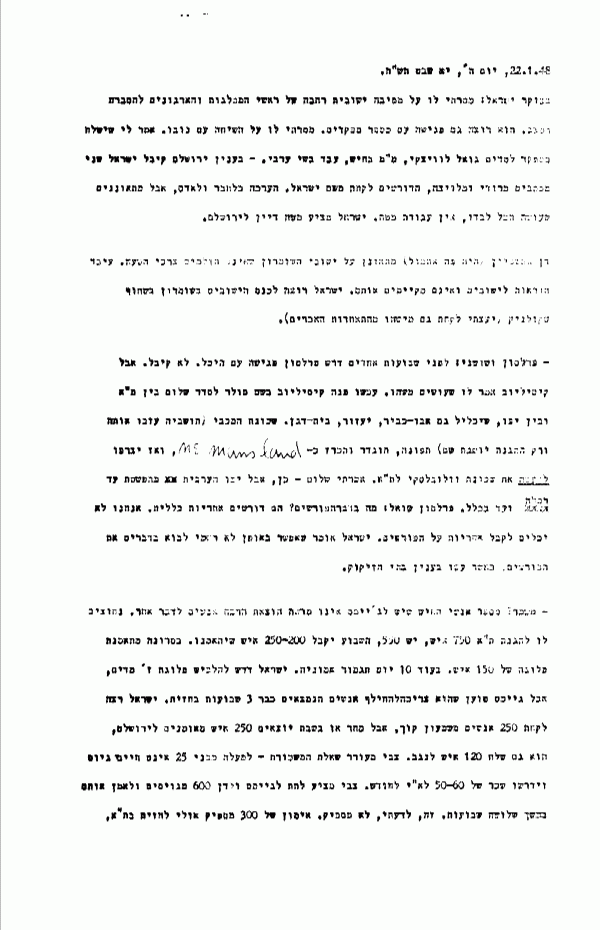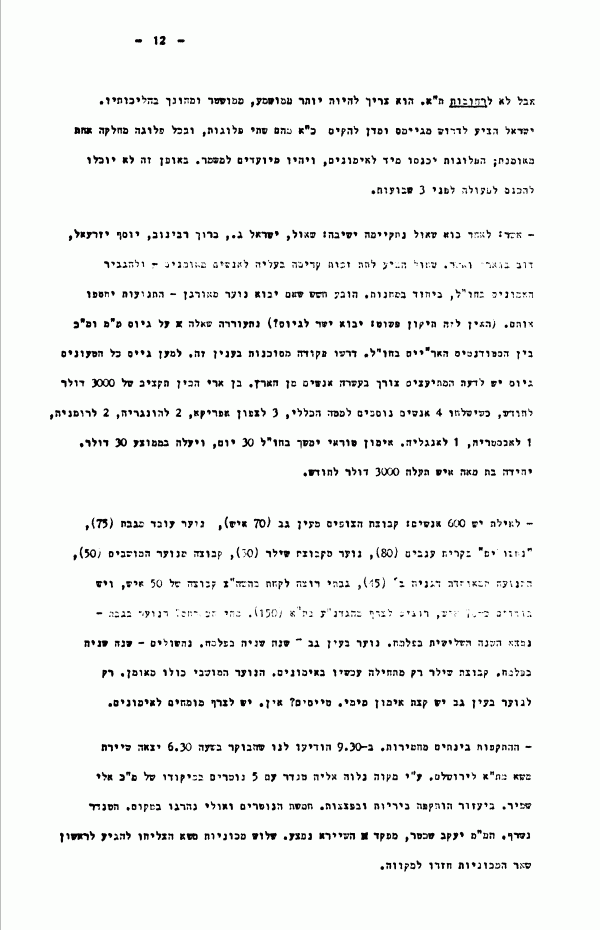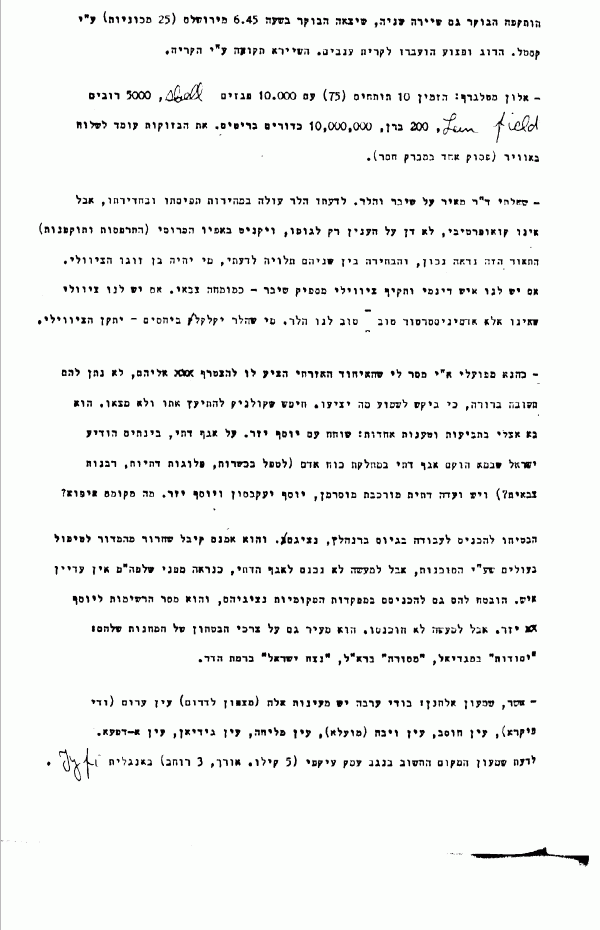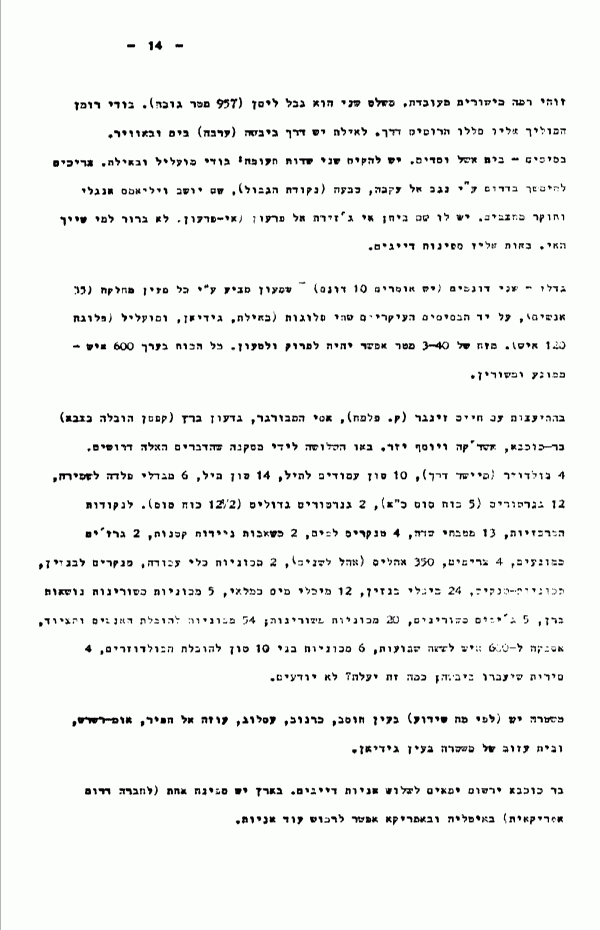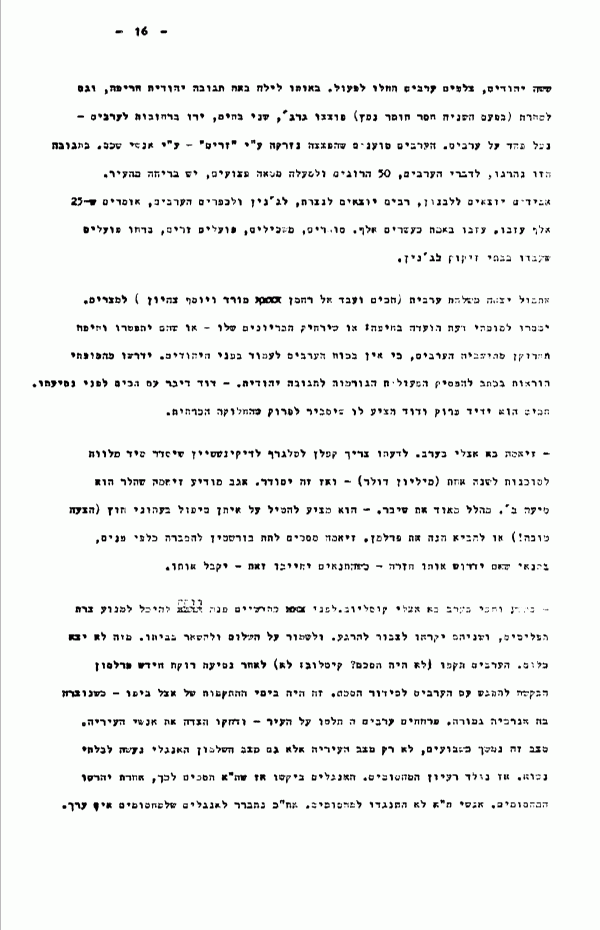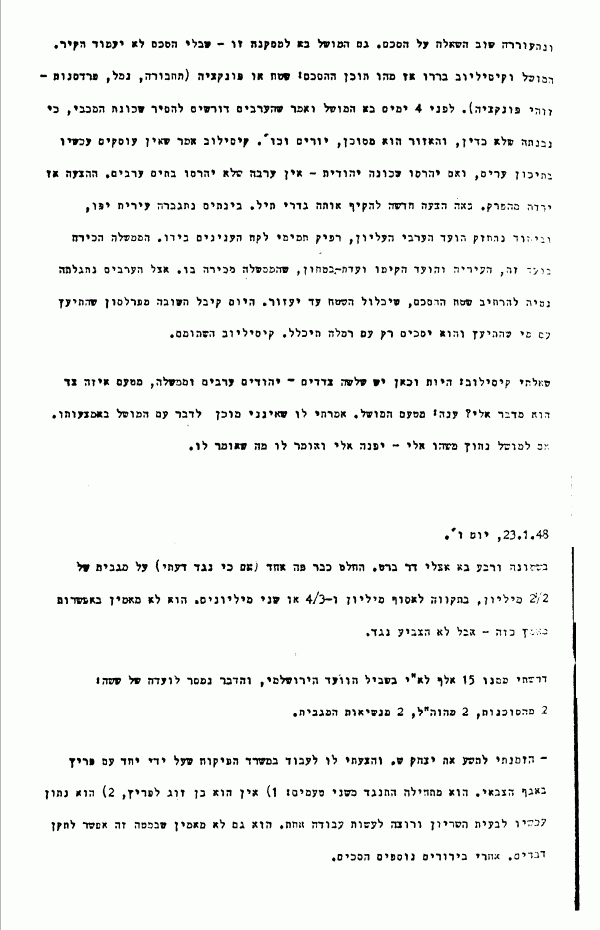1
of
Places:
Jerusalem
Amir
Dan
Jaffa
Bet Dagan
Yazur
Sarona
Austria
Romania
England
Ein Gev
Gvat
Degania
Shamir
Yesodot
Magdiel
Ora
Yotvata
Nevatim
Revivim
Haifa
Nablus
Nazareth
Egypt
The use of the photograph is subject to the Copyright Law, 2007
22.01.1948
225351
Thursday, 22 January 1948 In the morning, Yisrael [Galili]: I informed him about a large Yishuv gathering [meeting] of leaders of the parties and the organizations to explain the situation. He [Yisrael Galili] also wants a meeting with a number of commanders. I told him about the conversation with Novo. He told me that, as a commander for Sdom, he would send Goel Levitzky, platoon commander in Hayish [Haganah Field Corps], worked in Arab SHAI [the Haganah’s Arab affairs information service]. On the matter of Jerusalem, Yisrael received two letters, from Rudy [Amnon Zair] and Levitze [Yitzhak Levi], insisting that Yisrael [Amir] be removed from there. [There’s] appreciation [for him] as a friend and a person, but they complain that he does everything alone. There’s no military staff work [coordination]. Yisrael [Galili] proposes Moshe Dayan for Jerusalem. Dan Epstein [Even, central Galilee commander] (was here yesterday), complaining about the Samaria settlements that are not meeting the needs of the hour. He prepared instructions for the settlements, and they’re not carrying them out. Yisrael wants to convene the Samaria settlements, in cooperation with Shkolnik [Levi Eshkol] (I advised that he also bring someone from the farmers’ union). – Perlson [Eliezer Peri] and [Saadia] Shoshani [of the Tel Aviv municipality]: A few weeks ago Perlson requested a meeting with Haikal [mayor of Jaffa]. Wasn’t granted. But Kissilov [sp.] [Yaakov Av-Razi [sp.], Jewish district officer] told him something is being done. Now Kissilov, on behalf of [Commissioner] Fuller, is pursuing arrangements for peace between Tel Aviv and Jaffa, which would also include Abu Kabir, Yazur, [and] Bet Dagan. The neighborhood of HaMaccabi (whose residence left, and only the Haganah is there) will be cleared out, demarcated, and declared a No Man’s Land, and then the neighborhood of Volovelsky will effectively be added to Tel Aviv. I said: Peace – yes. But Arab Jaffa [for the purpose of this agreement] extends up to and including Ramle. Perlson asks: What about the secessionists? They [government representatives] are insisting on overall responsibility [on our part]. We can’t accept responsibility for the secessionists. Yisrael [Galili] says we can unofficially negotiate with the secessionists, as they did in the case of the refineries. Guard [police]? – The number of Hayish men that James [Michael Ben-Gal, Kiriati commander] has doesn’t allow for the removal [reassignment] of many men for something else. He needs 750 men for the defense of Tel Aviv and has 550. This week he’ll receive 200-250 men who will undergo training. A company of 150 men is training in Sarona. In 10 days it will complete its training. Yisrael called for this company to be dressed in [police] uniforms, but James claims that it needs to replace men who’ve already spent 3 weeks at the front. Yisrael wanted to take 250 men from Shimon Koch [Avidan] but tomorrow or on Saturday 250 [of his] trained men will set out for Jerusalem. He also sent 120 men to the Negev. – Zvi [Ayalon] raises the question of salary – those over 25 years old are not subject to mandatory conscription and will demand a salary of P£ 50-60 per month. Zvi suggests giving James and Dan [Even] 600 recruits to train [instead] for three weeks. In my view this is not enough. Training another 300 men might be enough for the Tel Aviv front, but not [for the policing of] the streets of Tel Aviv. [This force] needs to be more disciplined, regimented, and educated in terms of conduct. Yisrael suggested instructing James and Dan to form two companies each, with one trained platoon in each company: the companies would begin training immediately and would be designated for the guard. With this approach they wouldn’t be able to go into action sooner than three weeks. Asher [Ben-Natan, “Arthur”]: After Shaul [Avigur] arrived, a meeting was held [regarding the immigration of volunteers and recruitment abroad]: Shaul, Yisrael G., Baruch Rabinov, Yosef Yizraeli, Dov Benari, and Asher. Shaul suggested that trained men be given preference in immigration – and that training abroad, especially in camps, be increased. The concern was raised that if organized youth come – the movements will snatch them up. ([Ben-Gurion:] Doesn’t this have a simple solution? They would be drafted directly on arrival?). A question was raised as to the recruitment of platoon commanders and squad commanders among Eretz-Israeli students abroad. [They] called for an order from the [Jewish] Agency in this regard. In order to draft all those who are subject to conscription, the experts believe we need ten people from the country. Benari prepared a budget of $ 3,000 per month: 4 additional personnel for the General Staff [in Europe], 3 for North Africa, 2 for Hungary, 2 for Romania, 1 for Austria, 1 for England. New recruit training abroad will total 30 days and cost $ 30 on average. The unit of one hundred men will cost $ 3,000 per month. There are 600 people [designated for settlement] for Eilat: a group of Scouts from [the training in] ‘Ein Gev (70 people), Noar Oved from Gvat (75), “Nahsholim” from Kiryat ‘Anavim (80), youth from Kvutzat Shiller (50), a group from Noar HaMoshavim (50), HaTnua HaMeuhedet, Degania Bet (45). [Haim] Gvati wants to take a group of 50 from HaShomer HaTza’ir, and there are about 70 [unaffiliated] individuals. They want to place [members of] the Gadna in Tel Aviv (150). What’s their training? – The youth in Gvat is in its third year in the Palmach. The youth in ‘Ein Gev – second year in the Palmach. “Nahsholim” – second year in the Palmach. Kvutzat Shiller is only now starting its training. The Noar HaMoshavim are all trained. Only the youth in ‘Ein Gev have a bit of naval training. Pilots? – None. Experts [instructors] need to be included in the training. – Meanwhile the attacks are intensifying. At 9:30 we were informed that at 6:30 this morning a cargo convoy left Tel Aviv for Jerusalem. Near Mikve [Yisrael] it was joined by a pickup truck with 5 guards under the command of squad commander Eli Shamir. At Yazur it came under gunfire and bombardment. The five guards and Eli were killed on the spot. The pickup truck burned up. The platoon commander Ya’akov Shechter, commander of the convoy, was wounded. Three trucks managed to reach Rishon [LeZion]; the rest returned to Mikve. This morning a second convoy, which left Jerusalem at 6:45 a.m. (25 vehicles), was also attacked, near Kastel. One dead and one wounded were transferred to Kiryat ‘Anavim. The convoy is stuck near the Kirya [Kiryat ‘Anavim]. – Alon [Yehuda Arazi] telegraphs: He ordered 10 (75 mm) cannons with 10,000 shells, 5,000 Lee-Enfield [British] rifles, 200 Bren [light machine guns], 10,000,000 British bullets. The bazookas will be sent by air (one sentence of the cable is missing). – I asked Dr. Meir about Scheiber [Sheba] and Heller [as medical service commanders]. In his view Heller is better in terms of mental agility and acuity, but is not cooperative, doesn’t judge a situation strictly on its merits, and will be sardonic given his Prussian character (obsequiousness and belligerence). This description seems accurate, and the choice between the two depends, in my opinion, on who his civilian partner will be. If we have a dynamic and belligerent civilian person, then Scheiber will suffice – as a military expert. If we have a civilian who is no more than a good administrator – then Heller would suit us. Whatever relations Heller sabotages, the civilian will repair. – [Rabbi Kalman] Kahana, of Po’ale Agudas Israel, told me that HaIhud HaEzrahi [the Citizens’ Union] invited him to join them. He hasn’t given them a definitive answer because he wanted to hear what they have to offer. He looked for Shkolnik to consult with but didn’t find him. He came to me with a few demands and claims: He spoke with Yosef [Yizraeli] about a religious division [in the Security Department]. Meanwhile Yisrael reported that at National Headquarters a religious division has been established within the Personnel Department (to handle kashrut, religious platoons, military rabbinate?) and there’s a religious committee composed of [Shimon] Wasserman, Yosef Yaakovson, and Yosef Yizraeli. So where do they [Po’ale Agudas Israel] fit in? They were promised that their representative, Bernholtz [sp.], would be put to work in recruitment. He was indeed granted a release from the immigrant affairs unit affiliated with the [Jewish] Agency, but hasn’t actually joined the religious division, apparently because HaPo’el HaMizrachi doesn’t have anyone yet. They were also promised that their representatives would be assigned to local headquarters, and he gave the lists to Yosef Yizraeli, but they haven’t actually been assigned. He also raises the security needs of their camps [groups awaiting settlement]: “Yesodot” in Magdiel, “Masora” in Rishon LeZion, “Netsah Yisrael” in Ramat Hadar. – Asher [Ben-Natan], Shimon [Peres], Elhanan [Yishai]: Wadi Araba has the following springs (from north to south): ‘Ein ‘Arous (Wadi Fuqra) [‘Ein Tamar, at the Nahal Zin estuary], ‘Ein Husub [Hatzeva], ‘Ein Weiba [‘Ein Yahav], ‘Ein Meliha [Be’er Menuha], ‘Ein Ghadian [Yotvata], ‘Ein a-Difa’a [sp.] [Evrona, near Be’er Ora]. In Shimon’s view the most important place in the Negev is ‘Iqfi Valley (5 km long, 3 wide) in English IGFI [“Uvda Valley”]. This is a cultivated plateau. A second stronghold is Jabel Lissan [sp.] [Mt. Lotz] (957 m high); the Romans paved a road in Wadi Roman [Ramon Crater] that leads to it. There’s a route to Eilat by land (in the ‘Arava), sea, and air. Bases – Bet Eshel and Sdom. We need to establish two airfields: in Wadi Mishash [east of Nevatim] and in Eilat. We need to continue southward to Naqab al-Aqaba [sp.] [Nahal Shlomo], Taba (the border position), where Williams, an Englishman and mineral explorer, lives. He has a house there, Jazirat al-Faroun island [Coral island]. It’s not clear who the island belongs to. Fishing boats dock there. Its size – two dunams (some say 10 dunams). Shimon proposes [stationing] a platoon (35 men) next to every spring; two platoons next to the main bases (in Eilat, Ghadian, and Mishash – a company, 120 men). A 30-40 m pier [to be constructed in Eilat] that can be disassembled and loaded up. The entire force – about 600 men – motorized and armored. In consultation with Chaim Zinger [Ron] (a Palmach officer and explosives expert), Yossi Hamburger [Harel], Gideon Baratz (a transport captain in the [British] army), Bar-Kochba [Meirovitz], Asher’ke [Asher Peled], and Yosef Yizraeli, the three concluded that the following provisions are needed for settlement in the Negev: 4 bulldozers (to level a road), 10 tons of poles for barbed wire [fencing], 14 tons of barbed wire, 6 steel watchtowers, 12 generators (5 hp each), 2 large generators (12½ hp) for the main settlements, 13 field kitchens, 4 tankers for water, 2 small mobile pumps, 2 mobile garages, 4 sheds, 350 (two-person) tents, 2 vehicles, work tools, tankers for gasoline, tank-vehicles [tankers], 24 gasoline containers, 12 water containers for reserves, 5 Bren-fitted armored vehicles, 5 armored jeeps, 20 armored vehicles, 54 vehicles for personnel and equipment transport, supplies for 600 people for six weeks, six 10-ton vehicles to transport the bulldozers, 4 boats that will be transported on land. How much will it cost? – They don’t know. There are police (as far as we know) in ‘Ein Husub, Kurnub [Mamshit], ‘Isluj [near Revivim], Auja al-Hafir [Nitzana], Umm Rashrash [Eilat], and an abandoned police station in ‘Ein Ghadian [across the Jordanian border]. Bar-Kochba [Meirovitz] will register [recruit] sailors for three fishing boats. There’s one ship (belonging to a South African company) in the country. More ships can be purchased in Italy and America. The firepower of the Bedouin in the southern Negev is (estimated at) 5,000 rifles. I asked for a budget – from the experts (Yossi [Harel] and Chaim Zinger), and a plan for torpedo boats (Miller). – In the evening Yohanan [Ratner]: In Haifa the Arabs blockaded Jewish settlements [neighborhoods], to prevent transit to the port and industrial zone. It succeeded for 2-3 days, and no one from Hadar-Carmel could reach the factories or the port. The port was effectively severed from the entire Jewish settlement. [In order] to break through this blockade, they blew up houses. But it turns out there aren’t enough explosives. Command is not centralized in Haifa. There’s Moshe Zelicki [Carmel] and there’s Michael [Michael Michael, the city’s garrison force commander], and there’s no main public figure. The explosions plan was formulated by Michael. It succeeded. Yohanan is insisting that I establish a central authority in Haifa. We need hasbara [explanation, public relations] for the Arabs, as well as advance warnings – although the bombings have been effective. The Arab [dignitaries] want peace, but are not leaders of the Arabs, although the rioters also aren’t leaders, and the Jewish-Arab work continues in the municipality. At present the mood among the Jews is not bad, but during the days of the blockade despair prevailed and they thought that the Haganah was powerless. The blockade was carried out by snipers, not a large number of them. Now the Arabs are downtrodden, their shops are closed, many have left. If the blockade is renewed by the Arabs, we should, in Yohanan’s view, “declare a curfew” – that is, fire on Arab streets, stop transportation and thus [also] supplies (immediately their prices jump, for lack of organization and discipline, and the masses suffer). The mood in the Western Galilee is downtrodden. There are large well-armed gangs, and our people are not armed, so mines should be rushed to them. – Today mines were tried out around Herzliya (Yosef [Avidar], Shlomo [Gur], and J. [Jenka] Ratner were present) – nonetheless, Yosef R. is reluctant to order mines – because Haim [Slavin] does not believe in them. – Tuvia [Arazi, an Arab affairs intelligence officer] came from Haifa. There’s depression among the Arabs. The Jews in Hadar-Carmel overlook Christian as well as Muslim neighborhoods. We have more men and their equipment is better. There’s a lot of pressure on the National Committee from Arab merchants who need a respite. They claim that all the supplies for Arabs [in the country] – flour, sugar, etc. – come by way of Haifa. The National Committee believes that Haifa needs calm, or at least not to provoke war. For example: A week ago a bomb was tossed at a Jewish bus, and six Jews were killed. Arab snipers began to take action. That night there was a fierce Jewish response, as well as the following day (in the second instance there was a lack of explosives). A garage and two houses were blown up, Arabs on the street were shot at – and fear seized them. The Arabs claim that the bombing [of the Jewish bus] was carried out by “foreigners” – men from Nablus. In this response, according to the Arabs, 50 people were killed and more than 100 were wounded. People are fleeing the city. The well-to-do are leaving for Lebanon, and many are leaving for Nazareth and Jenin and villages. The Arabs say that 25,000 have left. In truth about 20,000 have left: merchants, educated [residents], foreign workers. Refinery workers have fled to Jenin. Yesterday on Arab delegation ([George] Hakim [Greek Catholic eparch], Abd al-Rahman, Murad and Yusuf Sahyun) left for Egypt. They’ll deliver the Haifa Committee’s opinion to the Mufti: Either he withdraws his bullies – or they resign and Haifa will be cleared of its Arab residents, because the Arabs don’t have the strength to stand up to the Jews. They’ll demand that the Mufti provide written instructions to stop the actions that are causing a Jewish response. David [Hacohen] spoke with Hakim before he left. Hakim is a friend of [King] Farouk, and David suggested that he explain to Farouk that the partition is necessary. – Ziama [Aran] came to see me in the evening. He thinks Kaplan should telegraph Dickenstein [AMPAL director] to immediately arrange a one-year loan for the [Jewish] Agency ($1 million) – and then it will be taken care of. Ziama comments incidentally that [Dr.] Heller is [a member of] Faction B. He has high praise for Scheiber [Sheba]. He proposes tasking [Walter] Eytan with handling the foreign press (good suggestion!) or bringing [Moshe – “Moish”] Pearlman here. Ziama agrees to provide [Yosef] Burstein for domestic hasbara, on the condition that if he demands his return – when circumstances necessitate – he’ll get him back. – At 9:30 p.m. Kissilov [Yaakov Av-Razi, Jewish district officer] came to see me. About two months ago [Israel] Rokach [mayor of Tel Aviv] approached Haikal [mayor of Jaffa] to prevent a refugee crisis, and they both called on the public to calm down and maintain peace and stay at home. Nothing came of this. The Arabs attacked (Wasn’t there an agreement? – Kissilov: “No”). After Rokach departed, Perlson [Eliezer Peri], interim mayor, renewed the request to meet with the Arabs and reach an agreement. This was during the days of ETZEL’s attacks in Jaffa – when it was in a state of complete anarchy. Arab hoodlums had taken over the city – and pushed the municipal officials aside. This situation lasted about two weeks. It wasn’t only the municipality but also the English government that was in an untenable situation. Then the idea of barricades emerged [from the Arabs]. The English then requested that Tel Aviv agree to this, otherwise the barricades would be destroyed. The Tel Aviv officials didn’t object to barricades. Then the English discovered that barricades are worthless, and once again the question of an agreement arose. The governor too reached this conclusion – that without an agreement the city won’t be able to carry on. The governor and Kissilov then clarified what the agreement would cover: territory or function (transport, port, citrus growing – is function). Four days ago the governor came and said that the Arabs are demanding that the neighborhood of HaMaccabi be removed because it was built illegally and the area is dangerous, there’s shooting from it, etc. Kissilov said that this is not the time for city planning, and that if a Jewish neighborhood is destroyed – there’s no guarantee that Arab homes won’t be destroyed. The proposal was taken off the table. A new proposal appeared: to surround it with barbed wire fencing. In the meanwhile the Jaffa municipality managed to prevail, and the Arab Higher Committee in particular gained strength. Rafiq Tamimi took the matter into his own hands. The government recognized this committee, [and] the city and the committee established a security commission, which the government recognizes. The Arabs have evinced a tendency to extend the territory of the agreement, to include the territory up to Yazur [as well]. Today he received a reply from Perlson, who consulted with whomever he consulted with, saying that he would agree only if Ramle is included. Kissilov was astonished. I asked Kissilov: Since there are three sides here – Jews, Arabs, and the government – on whose behalf is he speaking with me? He answered: “On behalf of the governor.” I told him that I’m not prepared to talk with the governor through him. If the governor needs something from me – he should approach me and I’ll tell him what I tell him.





